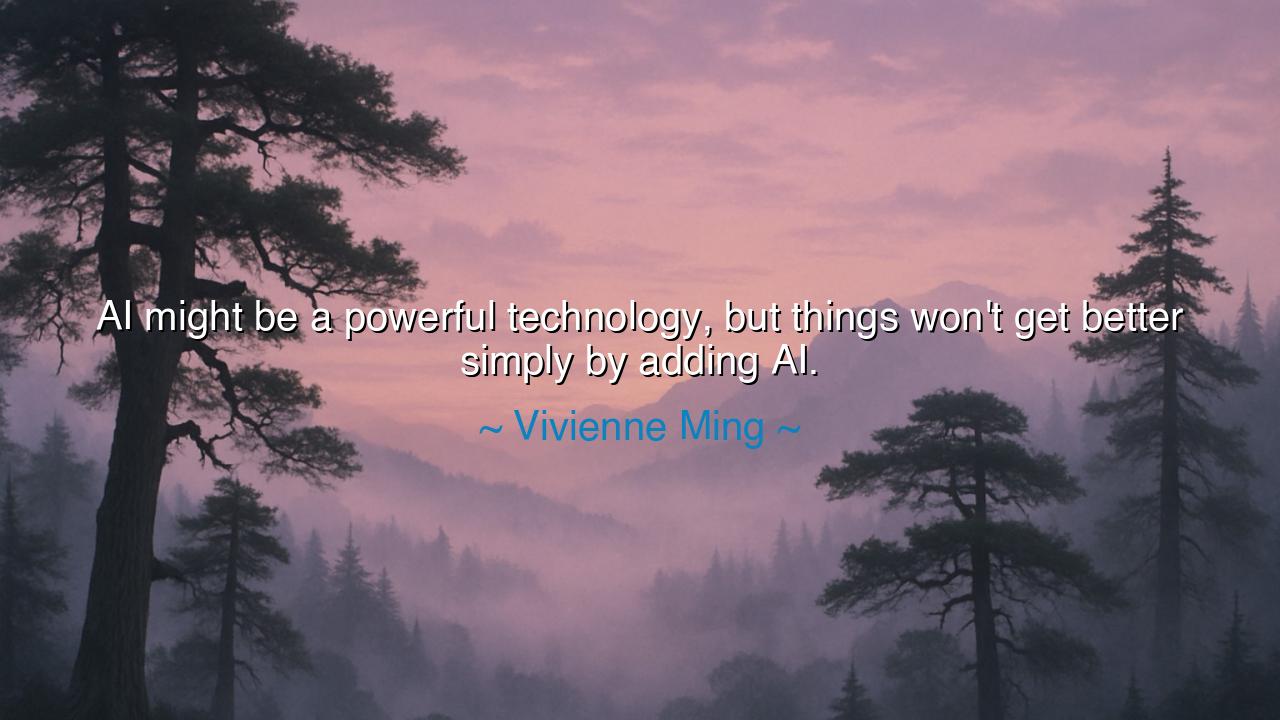
AI might be a powerful technology, but things won't get better






The words of Vivienne Ming—“AI might be a powerful technology, but things won't get better simply by adding AI”—resound like a call to wisdom amidst the fever of invention. They remind us that technology itself is never salvation; it is only a tool, an extension of the human will. The presence of artificial intelligence may magnify our power, but it cannot replace our judgment, our morality, or our purpose. To believe that the mere addition of AI guarantees progress is to fall into illusion. For without vision and responsibility, even the greatest tools become empty or dangerous.
The origin of this truth is as old as invention itself. When fire was first tamed, it did not make men wiser—it only made them stronger. With wisdom, it cooked food and warmed homes; without wisdom, it burned villages and destroyed forests. When the printing press emerged, it spread knowledge across nations, but it also spread lies and propaganda. When nuclear power was unlocked, it offered energy for cities, but it also unleashed the shadow of the atomic bomb. So too with AI—its value lies not in its existence but in the hands that wield it.
Consider the story of the dot-com boom in the 1990s. The internet was a mighty technology, filled with promise. Yet countless companies failed because they believed that simply adding the internet to their business would bring instant prosperity. They did not pair technology with sound vision, human need, or sustainable practice. The result was collapse. Only those who combined the tool with wisdom—companies that built meaningful solutions, not empty illusions—endured. Ming’s words echo this lesson: power alone does not guarantee progress; wisdom must guide the hand that wields it.
In our own age, we see the same danger. Some imagine that AI alone will heal medicine, end poverty, or make education universal. Yet without human care, AI in medicine may widen inequality, serving only the wealthy. Without wise policies, AI in education may reduce learning to shallow automation, stripping away the humanity of teaching. The tool is powerful, but the soul of progress lies in intent, design, and stewardship. To add AI without purpose is to build palaces upon sand.
And yet, Ming does not deny the greatness of AI. She calls it powerful, and indeed it is—able to analyze vast oceans of data, to see patterns hidden from the human eye, to accelerate discovery beyond the speed of thought. But power without direction is like a ship without a rudder. The greatness of AI will not be measured by its algorithms alone, but by the justice, compassion, and wisdom of those who set its course. Technology must serve humanity, not replace it.
The lesson for us, then, is both humbling and empowering. Do not worship tools, for they are lifeless without your will. Do not expect miracles from machines, for miracles are born in the heart. Instead, pair technology with wisdom, AI with ethics, invention with compassion. Let your vision lead, and let technology follow. Only then will the power of AI be transformed into true progress.
In practice, this means asking deeper questions whenever we adopt new technologies: What purpose does this serve? Whom does it benefit? Whom might it harm? It means designing AI not for profit alone, but for equity, sustainability, and dignity. It means remembering always that adding AI is not the goal—solving human problems with justice and foresight is the goal. The tool must never eclipse the task.
So let Ming’s words be carried forward as a lamp of guidance: AI may be powerful, but it is not destiny. Destiny is written not by tools but by the hands that wield them. Let us, then, wield this tool with wisdom, with humility, and with vision. For only then will the promise of AI become not an empty illusion, but a living blessing for generations to come.






AAdministratorAdministrator
Welcome, honored guests. Please leave a comment, we will respond soon